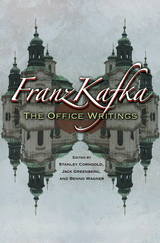Kafka's Office Writings: a cage writes for the bird

or is that the bird writes for the cage?
Franz Kafka's Office Writings, now collected for the first time in English.
To quote, Carl Wilson, "I can't decide which I want to read first: "Petition of the Toy Producers' Association in Katharinaberg, Erzgebirge (1912)," "Measures for Preventing Accidents from Wood-Planing Machines (1910)" or "A Public Psychiatric Hospital for German Bohemia (1916).""
And to quote from the publisher: Franz Kafka: The Office Writings brings together, for the first time in English, Kafka's most interesting professional writings, composed during his years as a high-ranking lawyer with the largest Workmen's Accident Insurance Institute in the Czech Lands of the Austro-Hungarian Empire. Franz Kafka (1883-1924) is commonly recognized as the greatest German prose writer of the twentieth century. It is less well known that he had an established legal career. Kafka's briefs reveal him to be a canny bureaucrat, sharp litigator, and innovative thinker on the social, political, and legal issues of his time. His official preoccupations inspired many of the themes and strategies of the novels and stories he wrote at night.
These documents include articles on workmen's compensation and workplace safety; appeals for the founding of a psychiatric hospital for shell-shocked veterans; and letters arguing relentlessly for a salary adequate to his merit. In adjudicating disputes, promoting legislative programs, and investigating workplace sites, Kafka's writings teem with details about the bureaucracy and technology of his day, such as spa elevators in Marienbad, the challenge of the automobile, and the perils of excavating in quarries while drunk. Beautifully translated, with valuable commentary by two of the world's leading Kafka scholars and one of America's most eminent civil rights lawyers, the documents cast rich light on the man and the writer and offer new insights to lovers of Kafka's novels and stories.

Comments